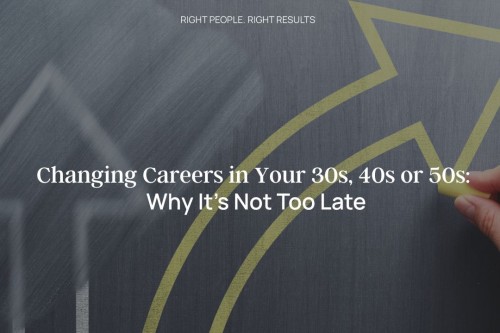
posted 15th May 2025
When it comes to changing career direction later in life, it is completely natural to feel uncertain and anxious about the unknown.
Be it in their 30s, 40s or 50s, many people worry they have missed their chance to make a change in their career — especially if they have spent years in the same industry, built a certain lifestyle that suits their needs, or have job security concerns.
The good news is career change is possible at any age and can be the most rewarding move you make.
At NuStaff, we speak to candidates who feel stuck, unfulfilled or undervalued in their current career paths. What many people don’t realise is that age and experience are considered assets, not barriers. In fact, some of the most confident, successful and committed people who make career changes are those who desire to make a fresh start later in life.
In this article, we challenge the myths behind mid-life career changes and offer practical advice to help you recognise your strengths so you can prepare for your new chapter with clarity and confidence.

Debunking the Myths About Late Career Changes
Changing careers is always a brave and significant decision to make no matter what stage you’re at professionally or personally. Though the decision is often met by fear, many of the limiting beliefs people have about age and work are simply not true.
Let’s explore the most common ones:
• Myth 1: “I’m too old to start over”
It is never too late to start over in your career, no matter your age. Age is often perceived as a disadvantage, but by changing your mindset it is viewed as a strength.
With experience comes resilience, ability to solve problems, and emotional intelligence — qualities that are highly valued and sought after by employers. By demonstrating your maturity, professionalism, and life experience to employers, you will stand out and position yourself as a strong candidate.
• Myth 2: “I’ll have to start at the bottom”
While taking the plunge to change careers can sometimes require starting over in a new role, that doesn’t always mean starting from scratch. The best thing about gaining valuable experience in the workplace is the ability to accumulate skills, leadership qualities, and insights that can be applied in new roles.
With the right guidance and CV support, many people who change careers often move sideways or step up into more rewarding positions.
• Myth 3: “I won’t be able to learn new skills”
Lifelong learning is more accessible than ever. From free online courses and evening classes to company-led and in-house training, there are endless ways for you to build new skills at any age.
Regardless of how many years you’ve been in the workforce, having a positive mindset and a willingness to learn is key to long-term success.
• Myth 4: “Employers only want young talent”
Nowadays, there are an increasing number of employers who value diversity of thought and experience – including age diversity. Experienced workers often bring stability, perspective and leadership to a workplace that helps build stronger, more balanced teams.
It is normal to feel nervous when starting a new career path, but with the right preparation you will be able to revitalise and strengthen your career.
How to Identify Your Transferable Skills
The key to changing careers isn’t through getting brand-new qualifications, it’s through learning how to identify, communicate and implement the skills you already have.
This can be done by following a few simple steps:
- Reflecting on your experience: By making a list of your achievements, daily responsibilities and key moments where you have added value, you can identify where your strengths lie and analyse what they say about you.
- Grouping your skills into categories: If you have no idea where to start with analysing your skills, group them into categories. Think in terms of soft skills (such as communication, leadership, or adaptability) and hard skills (which can include technical ability, software knowledge, or project management). By doing this, you will have a clear idea of where you excel and where you can grow further.
- Comparing job descriptions: Explore the roles in the industry you wish to enter and note the skills or qualities that are mentioned. From there, you can match your experience to these requirements.
- Asking others for input: Always view feedback as a valuable tool for professional development. Former colleagues, managers or mentors can often spot strengths you may have overlooked in yourself in previous roles – which you can demonstrate in your new role.
Steps to Successfully Change Careers
Making a career change doesn’t happen overnight; it takes time and careful preparation. But with structure and support, you can approach the process with confidence.
The transferable skills you identify will help you update your CV and tailor your interview answers, allowing you to present yourself with clarity and relevance no matter what industry you decide to enter.
Here are a few tips on how you can achieve this:
- Do your research: Read about the industries or roles you’re considering entering. What are the trends in those industries? Do you know what employers are looking for? Networking is also a powerful tool, so get connecting with people already working in those areas through networking events or online platforms such as LinkedIn.
- Start small with learning: Learning doesn’t have to mean going back to university to gain an education. Whether it’s a weekend course, free online training or simply shadowing someone in your chosen sector, taking small, proactive steps is a good way to build momentum.
- Update your CV and LinkedIn profile: Tailoring your online profile and messaging to highlight your transferable skills and your USP is key to success. By removing outdated content and irrelevant information, you can ensure that your professional summary aligns with your new career direction.
- Seek guidance: You don’t have to do it alone. Working with an employment agency like NuStaff can open new doors to exciting opportunities, help you position yourself strategically, and provide personalised advice every step of the way.
- Stay positive and persistent: It is important to stay positive when changing career paths. Changing careers takes effort and persistence, but it’s equally important to not let setbacks hold you back. Confidence grows from overcoming setbacks and as you take action, each step forward — even the smallest ones — counts as progress.
NuStaff Is Here to Help
At NuStaff, we believe it’s never too late to chase a fulfilling career. We’ve helped many job seekers of all ages explore new sectors, prepare for interviews, and secure roles that reflect their ambitions and skills.
We offer one-on-one career consultations, support in tailoring your CV and online profile, help you access training and upskilling opportunities, along with expert guidance throughout your application and interview process.
Whether you’re exploring new job opportunities or ready to take action, our friendly team will work with you to map out your next chapter and help you build a future you’re proud of.
Contact NuStaff for Expert Advice
Get in touch with our team today:
📞 Call us: 03442 645 456
📧 Email: info@nustaff.com
🌐 Visit: www.nustaff.com


